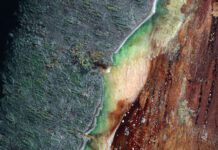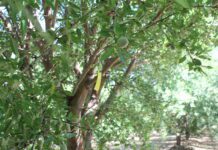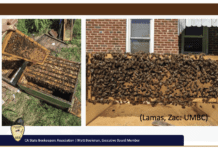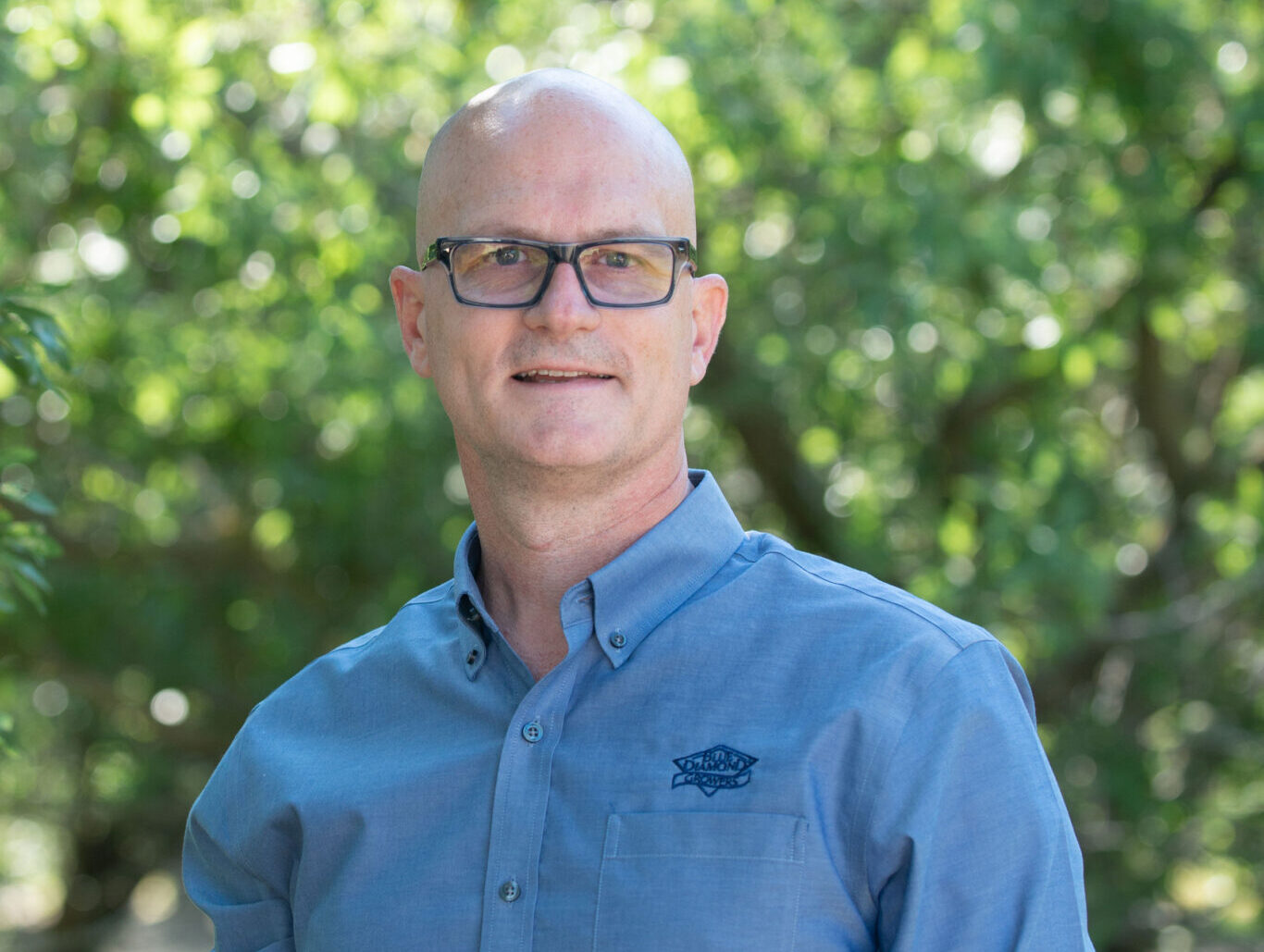
Blue Diamond Growers’ new Director of Sustainability position highlights the co-op’s continued commitment to sustainability for the almond industry, and the chosen candidate checks all the marks.
Dr. Daniel Sonke, a sustainability ‘czar’ with a long history in the almond industry, was Blue Diamond’s candidate of choice for the position.
“We’re very happy to have someone of Dan’s caliber join us from his unique history and growing up on an almond farm but also his great experience and expertise in this field, which is valuable for Blue Diamond and the almond industry,” said Brian Barczak, senior vice president of global supply for Blue Diamond.
Sonke grew up on a Blue Diamond member farm where he first developed his passion not only for the almond industry but also for sustainable growing practices. He went on to earn his undergraduate degree in environmental studies with an emphasis on agriculture from Dordt University and his graduate degree as a Doctor of Plant Medicine (a degree which covers agriculture, integrated pest management, entomology and plant pathology) from the University of Florida.
Sonke explained the journey of his sustainability career leading up to his new position at Blue Diamond, which he refers to as his “dream job.”
“In 2008, the program I was working for was taken over by SureHarvest, and I was taken on as an employee,” he said. “I was really pleased when, just a couple of weeks into my employment, the founder of SureHarvest, Dr. Jeff Dlott, invited me to attend an Almond Board [of California] meeting with him because they [SureHarvest] had previously sent in a proposal to develop a sustainability program for the Almond Board.”
Sonke didn’t know it yet, but at this meeting, he was witnessing the birth of what would become the California Almond Sustainability Program (CASP), a program that demonstrates almond growers’ sustainable farming practices to stakeholders and helps growers find ways to improve efficiencies as they relate to sustainable practices. Sonke’s roots and connections within the almond industry propelled him to the lead role for SureHarvest’s part in developing CASP.
“I was really proud of that work and loved the connection to the family farm,” he said.
A few years into the development of CASP, Sonke took on a position with Campbell Soup Company in its Sustainable Agriculture Program, which he classified as an “opportunity that was too good to pass up.” However, Sonke always knew that he’d end up back in the almond industry.
“Even the day I called up the Almond Board and said, ‘Hey, I’m taking another position,’ I started to drop hints that I wanted to come back to the almond industry one day and work in almond sustainability,” he said, noting that he continued to keep his lines of communication with the almond industry open.
Fast-forward to the present day, Sonke is pleased with the sustainability position that Blue Diamond offered him and agrees there was no better career choice that he could have made. “This is the job I’ve been thinking about for a very long time,” he said.

Sustainability at Blue Diamond
According to a Blue Diamond press release, Sonke is “responsible for integrating company performance with the 111-year-old almond cooperative’s sustainability pillars of economic viability, environmental stewardship and community well-being.”
Sonke’s hiring as Blue Diamond’s Director of Sustainability represents a larger commitment by the company to achieve its ongoing sustainability goals for not only its 3,000-plus co-op growers but for the entire almond industry. Barczak described the hiring as “re-energizing” the company’s sustainability program and creating a road map for taking Blue Diamond to the next level.
“[The program is] fully supported all the way from our Board of Directors to our executive team and across the organization,” he said, noting that Sonke is leading what Blue Diamond calls its Sustainability Steering Committee, which is in the initial stage of surveying customers, growers, employees and environmental experts to determine the types of sustainability goals that the company will lay out over the next few years.
Barczak said that everyone benefits from the program. “We see the importance of it for everyone involved from our employees to our customers to our growers,” he said, “and it ties directly in with the Almond Board and their 2025 sustainability goals.
“Blue Diamond has always been at the leading edge of many things within the almond industry, and this is just another area that we want to make sure we’re part of,” Barczak added.
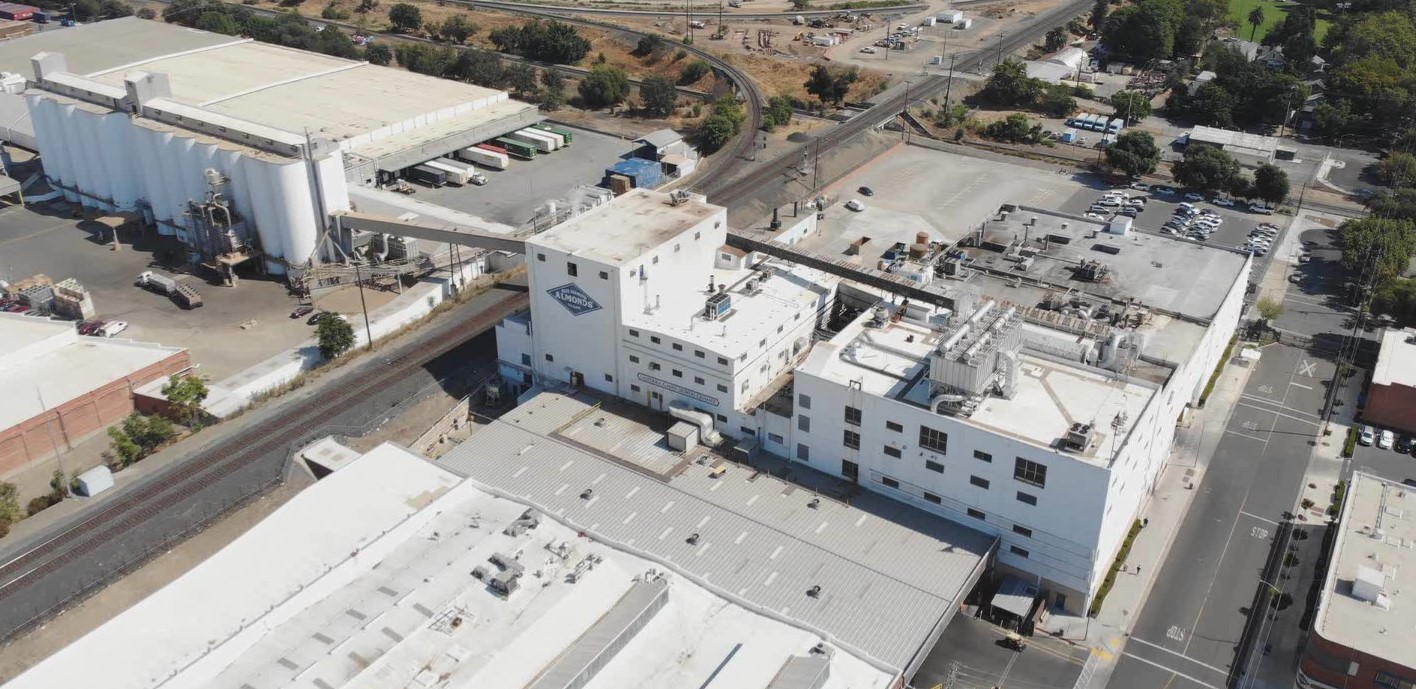
Telling the Sustainability Story
One aspect of Sonke’s position involves interacting with customers/buyers that are looking for a sustainability story to drive sales. Many are often curious how Blue Diamond growers are tackling different areas of sustainability, such as climate change, greenhouse gas reductions and pollinator health.
“The key message that I’m giving to our customers today is the excellent work that started before I got here where our Board of Directors decided last year to incentivize our growers to join the California Almond Sustainability Program,” Sonke said.
Sonke compared the incentive program Blue Diamond is pushing to other programs he’s come across throughout his sustainability career, noting that the program is world-class and that he’s happy with where it’s currently at. “I’m really excited to share with our customers and with the broader world that our sustainability program has had phenomenal effects just in the nine months that it’s been in place,” he said.
Blue Diamond has already reported a 250% increase in its growers enrolling in CASP and a 450% increase in its CASP acreage as a result of the incentive push since December 2020, according to Sonke, and the numbers are expected to be even higher when the final report comes in.
In addition to CASP, Sonke and Blue Diamond are working to build their own sustainability program for the company. The program will fully align with the values of CASP and put an emphasis on pollinator protection and habitat as well as soil health as it relates to cover crop usage for pollinators and soil.

Pollinators and Soil Health
One effort Sonke said Blue Diamond is already making on the pollination front is their Water for Bees program. The program provides strategies and educates growers on providing safe drinking sources for pollinators. Blue Diamond’s Member Relations team provides water buckets to participating growers with a netting that allows bees to drink clean water without drowning. Water for Bees is done in collaboration with Project Apis m., which funds research and outreach activities for honeybee health.
“Receiving that bucket and instructions is meant to be educational so that they can learn how to distribute their own buckets in addition to the ones they get in their orchard,” Sonke said. “It’s a significant program, with much higher uptake than we were initially expecting last year, and it’s resonating with growers and exposing them to practices that can really make a difference in the pollinator world.”
Additionally, Sonke said the company is asking growers to go through a greenhouse gas footprinting exercise, signaling the company’s recognition of the importance of a climate change focus. Research funded by the Almond Board through the University of California ANR Division is also underway to determine how almond orchards might meet and eventually exceed carbon neutrality.
While the process has just started, Sonke said that he and the company are eagerly identifying key metrics to begin tracking the sustainability journey, after which more defined company goals for the program will be developed.
“That is the process that lies ahead of us,” Sonke said, noting that his and Blue Diamond’s goal is to continue driving progress on grower engagement for CASP.








